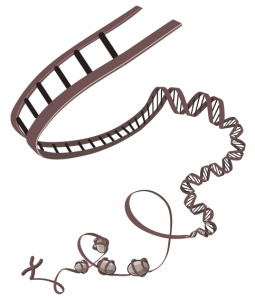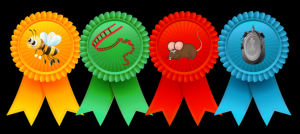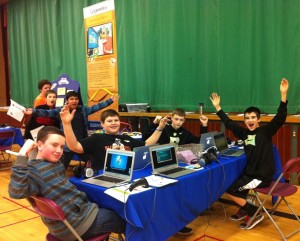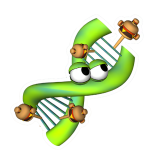Epigenetics
What is it?

Our health is influenced by our genetics and our epigenetics. Genetics refers to the DNA we get from our parents while epigenetics describes how our DNA’s activity can be changed in our bodies. Epigenetic marks are put on our DNA by the things we are exposed to in the environment and the choices that we make. These influence our health, our risk of disease, and can be passed to future generations!
How is it measured?
We developed a new station with an interactive game and manipulatives that helps participants learn about this brand new field of science! Tour three game levels about bees, mice and humans where you’ll learn about genetics (which refers to the DNA we get from our pare nts) and epigenetics (which describes how DNA’s activity can be changed in our bodies). In the fourth game level, create an avatar and twin-ize them. Select the behaviors for you and your twin to see how different you can become. Fast forward in time to see how your genomes remain the same, but your epigenomes become different. But what else is changing? We’ve learned that identical twins aren’t so identical after all. Our choices matter!

Play the Game!
Interested in playing the “Nurture your Nature” game? Click here! Or check out our one-page description (.docx, .pdf ) about the game.

How we determined the categories?
This station doesn’t have health categories like our other stations. Instead, you’ll select your diet, sleep, air and stress levels to see how different your avatar and their twin become. See how their epigenomes and their health can be changed by their choices.
Where to get more information…
We have developed several printable handouts and manipulatives that you’re welcome to use! Teachers, don’t forget to see our lesson library for free, downloadable classroom lessons and activities about epigenetics.
| Description | Download as |
| About Epigenetics! One page description about what it is, why it matters and how it works |
.docx |
| Timeline — From Genetics to Epigenetics DNA has come a long way over the millenia. Check out this quick time-travelling tour of DNA through history |
.doc |
| Nutrition and your Epigenome One page flyer about how our diets can affect our epigenomes; diet content by Univ. of Utah’s Genetic Science Learning Center |
.docx |
| Epigenetics Flip Board Create your own question and answer flip board using this easy template! |
.pptx |
| Ideas for Epigenetic Manipulatives Here are some of the ways we explain epigenetics at our fairs. Feel free to adapt these ideas to create your own manipulatives! |
.docx |
| Epigenetics Glossary of Terms Brief glossary of terms created by Oregon teachers to help explain epigenetics to students |
.docx |
| Briefing Sheet for Students One page epigenetics briefing sheet for students created by Oregon teachers |
.docx |
| Briefing Sheet for Parents One page briefing sheet for parents whose students are learning about epigentics; created by Oregon teachers |
.docx |
| Briefing Sheet for Teachers Created by Oregon teachers, this background information is great for teachers who are new to epigenetics |
.docx |
| Briefing Sheet for Principals At a glance information for principals whose teachers are discussing epigenetics in the classroom |
.docx |
| Online Resources for Epigenetics Resources for teachers discussing epigenetics in the classroom; compiled by Oregon teachers |
.docx |
Research Bibliography

Developmental Origins of Disease: www.ohsu.edu/mooreinstitute
Genetics and Epigenetics: The University of Utah’s Genetic Science Learning Center has a beautiful site with lots of information on these two areas: http://learn.genetics.utah.edu/
Special Thanks
This project was funded by a pilot project grant from the OHSU Bob and Charlee Moore Institute for Nutrition and Wellness and by the National Institutes of Health through a grant to the Interdisciplinary Center for Epigenetics, Science and Society (5P20HG00551).
Special thanks to epigenetic researchers Dr. Mitchell Turker (OHSU), Dr. Lisa Weasel (Portland State Univ) and Dr. Cathy Klein (NYU) for their expert review of the “Nurture your Nature” game and its science. We would also like to thank the amazing Oregon teachers who translated this new area of science for the classroom: Alison Charbonneau, June Poling, Kristin Allan, Debbie Frankel, Cheryl McGinnis and Berk Moss.



